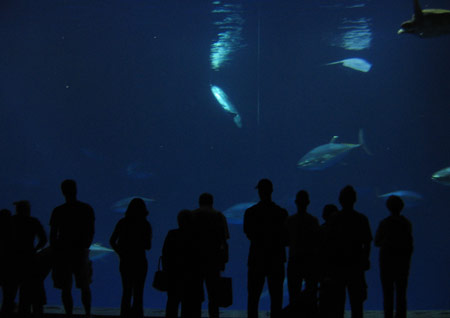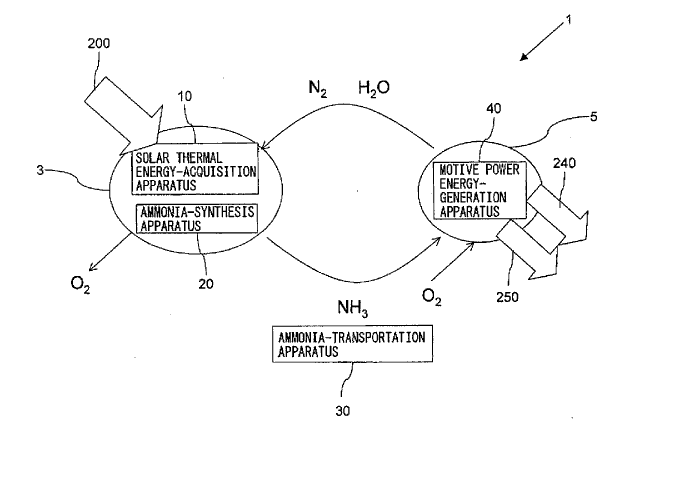
The Monte Ray Aquarium is awsome
For several reasons I am interested in shipping and our climate. Shipping is and has been a major contributor to emissions, burning the roughest fuel available, providing an easy way for oil companies to capitalize on their inventory. It’s been asserted that one ship pollutes more than 50 million cars. Great efforts have been made to increase fuel economy and reduce pollutions, amongs other the adoption of new fuel standards, especially sulphur. There are many things one can say about the global economy shaped by oil but that doesn’t mean that transportation or logistics in itself can not be clean. A general assault on it in its current form from the direction of environmentalists is to be expected though.


On the right the tyre container with life on the outside
Today the BBC website had an item about lost shipping containers that seemed to attempt create concern regarding the many containers accidentally dropped of ships while ignoring the 1000 pound gorrilla in the room. The team from Monterey Bay Aquarium Research Institute (Mbari) tracked down a container that was lost in the bay in 2004 to see how it was doing. This container was fulled with tyres, which is not unimportant because in the 70’s tires had been dumped in an effort to create an artificial reef (Osborne reef) near Florida.

The promoted issues
Tyres don’t invite ocean life because they are toxic, so the said container is to be expected to house only specific microrganisms. The article doesn’t look at that aspect though, it has several points.
1. Containers help invasive species which can be devestating to local ecosystems.
Invasive species are a problem, the main source of it has been ballast water in big ships, also containerships. the idea that containers on the ocean floor would have a relatively significant impact is far fetched.
2. The material in them can be toxic. True in this case, one could suggest rules that put toxic containers deeper inside the ship, so they have less risk of ending up in the ocean.
The below quote however is a bit disingenuous.
"They’re going to be sitting in the bottom of the ocean for hundreds if not thousands of years, and building up through time," Dr DeVogelaere said.
This is not the main problem facing the oceans. The oceans are dying because of acidification and anoxia and will be dead in a century or so. This fact is more important to make and certainly has an impact on shipping and other industrial activities. Making a fuss about dropped containers is distracting. It’s not sure whether this is intentional, so whether the scientists fear being told their science is growing less relevant by the day because of marine species loss, and they therfore ignore the biggest threat to their coveted oceans. This is hard to tell in a country that is so dependend on the oil/credit system.
"We’d like to understand the business, overlaying that with the biology and ecology. We want start to meld the thinking of the two so we’re not doing science without understanding containers and so the container business is thinking about ecological impact."
So these scientists identified a foe, the container, dressed it up to look more dangerous (toxic and a long term risk) and are courting funds to do research in this area while they have a major problem with dying oceans. It seems the scientists are looking for cash. It is not an uncommon pattern to see science focus on an area of weakness in business untill they get payed to do research that shows there is no problem. As many people take a jackal approach to the shipping industry in California, whay shouldn’t the people from Monte Ray?
The Gorrilla in the room
The real issue for someone that has no direct lifestyle stake in these matters can be summed up as "Oceans are dying, oil based logistics is a cause, logisitics this way is unsustainable, also because production will not warrant it in the medium term". Shipping collapsed in 2008, it will collapse when the US defaults as expected end of august 2011. This is a tragedy, but there still the industry does something that has always been necessary. What would be the best that could come out of a reassesment based on it’s enviromental merits?
1. Make people aware oceans are at risk, because dead oceans become a source of toxic gasses that can wipe out most species, plants and animals. This happend at the end of the Permian era for the same reasons it could happen now. The problem is not the responsibility of any industry, it’s the result of using fossil fuels.
2. Note that iron deficiency is a problem in moste oceanic zones, not near the coast usually, because upwelling currents take iron rich water to the top layers there, but otherwise a little added iron fosters life. Iron fertilization is one of the strategies against so called dead zones and loss of oceanic biomass. One can see by how little these containers rusted in the 6 years under water that the problem with ocean life is lack of oxygen, anoxia.
3. Shipping can switch to renewable bunker fuels, specifically ammonia. This has the potential to shape a new world economy, so someone patented it! 

Motive power energy generation apparatus? You mean ENGINE?
Why Ammonia?
There are many reasons why one would want to switch to ammonia.
1. Ammonia is the fuel of life. All plants need it.
2. It burns cabon free as it contains no carbon.
3. It can be generated with renewable energy easily and abundantly.
4. It is a fuel usable in fuel cells and combustion engines.
5. There is no shortage of the base materials, water and nitrogen.
So in recognizing the dangers of CO2 to our oceans one could build a new economy based on ammonia that actually helps restore life in the oceans (as large parts are ammonia deficient). Ammonia factories could be wave powered and based at sea. This would secure logistics against any fossil fuel supply collapse (although the industry is so important it’s not likely to be left without fuel soon). It presents an opportunity that is hard to ignore, unlike the Monte Ray attempt to gain traction for research that ignores the biggest problem relevant to it’s field.